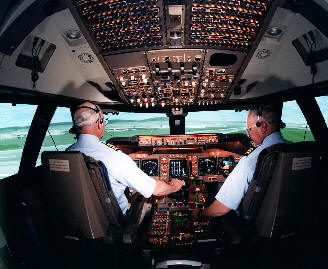|
|||||||||||
|
|
|
|||
|
By |
||||
 |
August 2010 - The
Air Line Pilots Association, Int’l (ALPA) brought the views of nearly
53,000 airline pilots to the FAA’s Partnership for Safety Symposium,
held this week in “Airline pilots learn the importance of adhering to standard procedures and phraseology in their communications and the value of training and discipline early in their basic flight training,” said Capt. John Prater, ALPA’s president, at the conclusion of the FAA symposium. For professional airline pilots, that knowledge is expanded and reinforced as new first officers also receive mentoring from captains. “These principles remain essential to safety no matter how experienced an aviator becomes,” Prater noted. |
|||
|
|
||||
|
ALPA maintains
that throughout the national and international airspace system, the
fundamentals of undergoing thorough training, adhering to standard
operating procedures, employing standard phraseology, and capitalizing
on techniques for good radio discipline that have been developed over
decades are vitally important. From using clearly defined call signs to
accurately understanding clearances and ensuring that all parties have a
common understanding of radio transmissions, the major topics that were
discussed at the symposium hinge on these fundamentals.
While air
transportation remains extremely safe, ALPA urges the aviation industry
to continue efforts to ensure that pilot—controller and other flight
operation communications are as relevant and accurate as possible. ALPA
pilot safety representatives participated in the FAA symposium to
discuss pilots’ concerns and best practices in communications issues
such as hear-back/read-back between pilots and controllers, standard
phraseology, similar-sounding call signs, and sharing of critical
information. “Safety is enhanced when pilots receive as much critical information as possible regarding runway assignments, weather, turbulence, and other operational issues,” said Capt. Rory Kay, ALPA’s Executive Air Safety Chairman. “Providing pertinent information to the flight crew proactively and in advance of critical phases of flight avoids distractions once the flight is under way and enhances safety for passengers and crew.” |
||||
|
ALPA
representatives underscored the need to ensure that the large amount of
information that pilots receive in the cockpit, including NOTAMS, is
prioritized and as tailored as possible to the safe operation of the
specific flight.
“Pilots receive a
huge amount of information when planning a flight—some of which is
critical to its safe operation, while some information may not be
especially relevant to the individual flight,” Kay continued. “Pilots
need the information we receive to be prioritized so that we can quickly
determine what is of greatest importance to the safety of our flight.”
Additionally, all
of the working groups highlighted that communications can be
significantly enhanced when pilots and controllers clearly understand
each other’s roles and responsibilities. ALPA representatives were
encouraged by the universal stakeholder agreement that allowing a
controller to observe flight crew training in a flight simulator or to
sit on the flight deck during a familiarization flight ultimately
increases flight safety. Such exposure to the operational environment
and the opportunity to see how air traffic control instructions come
across in the cockpit provides invaluable insight that cannot be
obtained any other way. |
|
|
| Other News Stories |
| ©AvStop
Online Magazine
Contact
Us
Return To News
|
|


